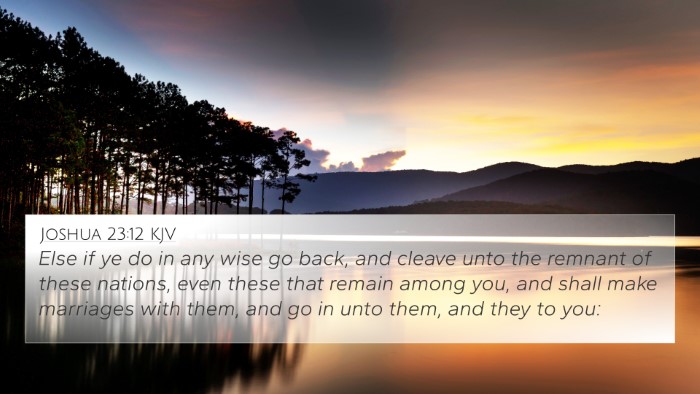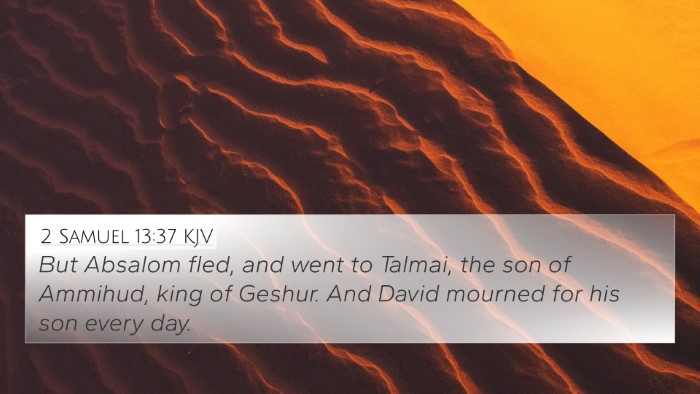Understanding Joshua 13:13
Joshua 13:13 states: “Nevertheless the children of Israel expelled not the Geshurites, nor the Maachathites: but the Geshurites and the Maachathites dwell among the Israelites until this day.” This verse highlights the incomplete conquest of the promised land by the Israelites and serves as a testimony to the failure to drive out all the inhabitants as commanded by God.
Meaning and Interpretation
The failure to expel the Geshurites and Maachathites is significant in understanding the Israelites' journey. Below are insights drawn from respected public domain commentaries:
-
Matthew Henry's Commentary:
Henry emphasizes that this lack of action demonstrates a neglect of duty on the part of Israel. He notes that the Israelites were to eradicate all idolatry and sin, yet they allowed these groups to dwell among them. This decision reflected a compromise that would have repercussions in their history.
-
Albert Barnes' Notes:
Barnes points out that the Geshurites and Maachathites became a source of temptation for Israel. Their presence indicated a breach in obedience to God’s instructions, and he echoes the sentiment that partial obedience leads to further issues down the line.
-
Adam Clarke's Commentary:
Clarke discusses the historical context, mentioning that Geshur is in modern-day Gilead. He highlights that the presence of these groups fulfilled God’s true prophecy concerning Israel’s failures and the consequences of not following God completely.
Cross-References and Connections
This verse is supported by several biblical connections that enhance the understanding of Israel’s conquest, obedience, and failures:
- Numbers 33:55-56: Warns the Israelites that if they do not drive out the inhabitants, those inhabitants will be thorns in their sides.
- Judges 1:27-28: Describes the continuing presence of the Canaanites and the Israelites’ failure to drive them out completely.
- Deuteronomy 7:2: Commands the Israelites to utterly destroy the nations occupying the land.
- Joshua 15:63: Also mentions the failure to conquer certain areas completely.
- 1 Chronicles 2:23: References the Geshurites as a significant group during the time of David.
- 2 Samuel 15:23-24: References a Geshurite during Absalom's rebellion.
- Joshua 1:18: Advises those who oppose God's plan receive death, reinforcing the theme of total commitment.
- Exodus 23:33: Warns Israel against allowing the inhabitants of the land to remain, lest they turn the Israelites to idolatry.
- Ezra 9:1-2: Shows a similar context of intermingling with foreign peoples leading to sin.
Thematic Connections
This verse speaks to broader themes found throughout the Bible, particularly concerning:
- Obedience to God: The command to occupy the land entirely and the spiritual implications of partial obedience.
- Consequences of Compromise: The impact of allowing sin and idolatry to persist within one's community.
- The Role of Faithfulness: God’s promises were conditional upon Israel's faithfulness to His commands.
Tools for Bible Cross-Referencing
To deepen your understanding and study, here are some tools commonly used for Bible verse cross-referencing:
- Bible Concordance: A helpful resource for locating verses related to a specific word or theme.
- Bible Reference Resources: Books and online tools that provide comprehensive listings of relevant cross-references.
- Cross-Reference Bible Study Guides: Tools that highlight parallel scripture passages.
- Bible Chain References: Systems that connect verses linearly based on thematic content.
Conclusion
Joshua 13:13 serves as a reminder of the importance of full obedience to God. As seen in the connected verses and insights from biblical scholars, the incomplete actions of the Israelites led to a continual struggle with idolatry and sin throughout their history. This underscores a significant theological lesson regarding the repercussions of allowing compromise in one’s spiritual journey.








